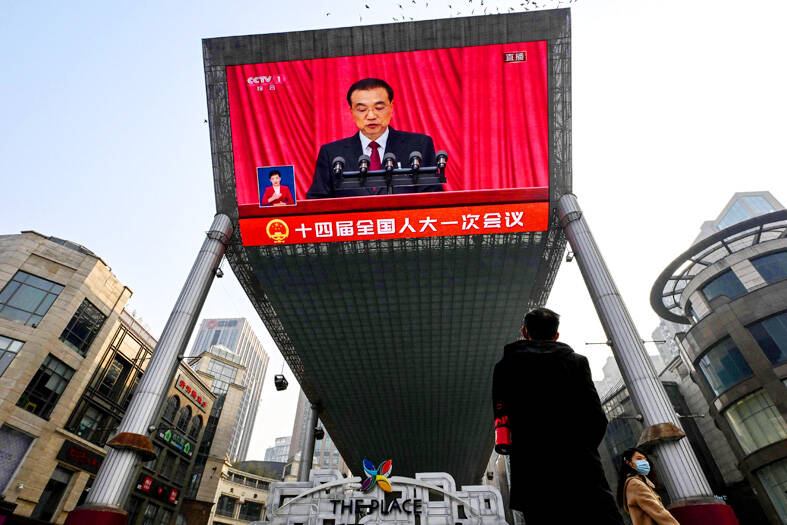China said its defense spending would grow by 7.2 percent this year — the fastest pace since 2019 amid increasing tensions with the US on a range of issues, including Taiwan.
The increase in the world’s second-largest defense budget came as Beijing announced an economic growth goal of about 5 percent for this year — one of its lowest in decades.
Military expenditure is expected to rise to 1.55 trillion yuan (US$224.4 billion) this year, according to the Chinese Ministry of Finance’s annual report released yesterday at the start of the Chinese National People’s Congress in Beijing.

Photo: AFP
It officially rose 7.1 percent last year.
Spending on China’s People’s Liberation Army (PLA) has increased by at least 6.6 percent each year for the past three decades, keeping pace or often exceeding economic growth.
Outgoing Chinese Premier Li Keqiang (李克強) told congress delegates that “external attempts to suppress and contain China are escalating.”
“The armed forces should intensify military training and preparedness across the board,” he said as he presented the government’s annual work report to thousands of amassed delegates in Beijing’s Great Hall of the People.
The military must “devote greater energy to training under combat conditions, and ... strengthen military work in all directions and domains,” he added.
China’s defense spending still pales in comparison with the US, which has allotted more than US$800 billion for its military this year.
The defense figure that China unveils every year is among the few official announcements that offer signs of progress the PLA is making in its revamp.
Analysts outside the nation say the actual amount far exceeds the official sum, partly because research and development expenditures are not included.
This year’s figure “feels in part a reflection of the growing increase in military spending we see globally and regionally, while also a reflection of increased sense of threat in Beijing and a need to be prepared for eventualities,” said Raffaello Pantucci, a senior fellow at the S. Rajaratnam School of International Studies in Singapore.
“Taiwan will clearly be seen as an important focus, but my view would be that Chinese preparations go farther than this and remain about building a globally competitive military,” Pantucci said.
Yesterday’s conservative economic goals followed China posting just 3 percent growth last year, widely missing its 5.5 percent target as the economy strained under the effects of strict COVID-19 containment policies and a property crisis.
Li struck a bullish tone in his speech, saying that China’s economy “is staging a steady recovery and demonstrating vast potential and momentum for further growth.”
The sustained growth in defense spending despite sagging economic expectations showed that “security is now much more important for the national leadership” than before, said Alfred Muluan Wu (吳木鑾), an associate professor at the University of Singapore’s Lee Kuan Yew School of Public Policy.
“It is even, to some extent, more important than economic growth,” he said.
China also plans to increase its public security budget by 6.4 percent — the fastest pace in five years. That rise comes after the Asian nation experienced its most widespread protests in decades in November last year due to broad discontent over harsh COVID-19 regulations.

US President Donald Trump yesterday announced sweeping "reciprocal tariffs" on US trading partners, including a 32 percent tax on goods from Taiwan that is set to take effect on Wednesday. At a Rose Garden event, Trump declared a 10 percent baseline tax on imports from all countries, with the White House saying it would take effect on Saturday. Countries with larger trade surpluses with the US would face higher duties beginning on Wednesday, including Taiwan (32 percent), China (34 percent), Japan (24 percent), South Korea (25 percent), Vietnam (46 percent) and Thailand (36 percent). Canada and Mexico, the two largest US trading

AIR SUPPORT: The Ministry of National Defense thanked the US for the delivery, adding that it was an indicator of the White House’s commitment to the Taiwan Relations Act Deputy Minister of National Defense Po Horng-huei (柏鴻輝) and Representative to the US Alexander Yui on Friday attended a delivery ceremony for the first of Taiwan’s long-awaited 66 F-16C/D Block 70 jets at a Lockheed Martin Corp factory in Greenville, South Carolina. “We are so proud to be the global home of the F-16 and to support Taiwan’s air defense capabilities,” US Representative William Timmons wrote on X, alongside a photograph of Taiwanese and US officials at the event. The F-16C/D Block 70 jets Taiwan ordered have the same capabilities as aircraft that had been upgraded to F-16Vs. The batch of Lockheed Martin

GRIDLOCK: The National Fire Agency’s Special Search and Rescue team is on standby to travel to the countries to help out with the rescue effort A powerful earthquake rocked Myanmar and neighboring Thailand yesterday, killing at least three people in Bangkok and burying dozens when a high-rise building under construction collapsed. Footage shared on social media from Myanmar’s second-largest city showed widespread destruction, raising fears that many were trapped under the rubble or killed. The magnitude 7.7 earthquake, with an epicenter near Mandalay in Myanmar, struck at midday and was followed by a strong magnitude 6.4 aftershock. The extent of death, injury and destruction — especially in Myanmar, which is embroiled in a civil war and where information is tightly controlled at the best of times —

China's military today said it began joint army, navy and rocket force exercises around Taiwan to "serve as a stern warning and powerful deterrent against Taiwanese independence," calling President William Lai (賴清德) a "parasite." The exercises come after Lai called Beijing a "foreign hostile force" last month. More than 10 Chinese military ships approached close to Taiwan's 24 nautical mile (44.4km) contiguous zone this morning and Taiwan sent its own warships to respond, two senior Taiwanese officials said. Taiwan has not yet detected any live fire by the Chinese military so far, one of the officials said. The drills took place after US Secretary